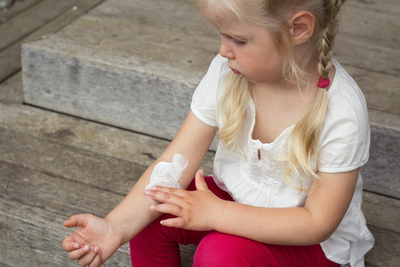Pediatric Eczema Treatment

Eczema, a common skin condition, often begins in childhood and can cause significant discomfort and distress for both children and parents. Pediatric eczema, also known as atopic dermatitis, is a chronic skin condition characterized by itchy, inflamed patches of skin. If your child is showing symptoms of eczema, seeking advice from a pediatric eczema specialist is crucial for effective treatment and long-term management.
What is Pediatric Eczema?
Pediatric eczema refers to eczema that affects infants, toddlers and children. The condition causes the skin to become dry, red, and itchy, often leading to scratching and irritation. While eczema can appear at any age, it most commonly develops in early childhood and can persist into the teen years or adulthood. Understanding the causes and available pediatric eczema treatment options can help parents manage their child’s condition effectively.
Pediatric Eczema vs Pediatric Psoriasis
While eczema and psoriasis are both skin conditions that cause inflammation, they differ in their presentation and underlying causes. Eczema pediatric cases are marked by patches of dry, itchy skin, often appearing in areas like the fronts of the elbows, knees and face. On the other hand, pediatric psoriasis tends to produce thicker, scaly patches that are red and silver, commonly found on the scalp, knees and backs of elbows.
Psoriasis is an autoimmune condition, while eczema is triggered by environmental factors, allergens, and genetic predisposition. A pediatric dermatology provider can differentiate between the two through a thorough skin examination and suggest a suitable treatment plan. This distinction is essential because the treatment approaches for pediatric eczema and pediatric psoriasis differ significantly.
What Causes Pediatric Eczema?
Pediatric eczema cases are typically caused by a combination of genetic and environmental factors. Children with a family history of eczema, asthma or hay fever are more likely to develop the condition. Some of the main triggers include:
- Environmental allergens: Pollen, dust mites and pet dander can aggravate pediatric eczema.
- Weather changes: Cold, dry air in the winter and hot, humid conditions in the summer can worsen symptoms.
- Irritants: Soaps, detergents, and certain fabrics like wool can irritate sensitive skin.
- Stress: Emotional stress and anxiety can trigger flare-ups in children.
- Food allergies: Some children with eczema may also have food allergies, which can exacerbate the condition.
Symptoms of Pediatric Eczema
Symptoms of pediatric eczema can vary from one case to another. A rash caused by eczema can look different depending on which area of the body it affects. One of the defining characteristics of eczema is its intense itch. Some children might scratch their skin so aggressively during an eczema flare-up that it bleeds. Eczema’s itch-scratch-cycle makes it particularly uncomfortable.
The most common eczema symptoms include:
- An intense itch
- Inflamed and red skin
- Swollen areas
- Scaling on the skin
- Sensitive skin
- Dry skin
- Patches of rough or darkly colored skin
Diagnosing Pediatric Eczema
Accurately diagnosing pediatric eczema is the first step toward effective management. During a visit to a pediatric eczema dermatology specialist, a thorough evaluation will be conducted, including a review of the child’s medical history, family history of skin conditions, and environmental triggers.
In some cases, patch testing or allergy testing may be performed to identify potential allergens that could be contributing to flare-ups. A pediatric eczema provider is highly trained to distinguish between eczema, psoriasis, and other common skin conditions in children, ensuring that the right course of treatment is chosen.
Treatment for Pediatric Eczema
Managing pediatric eczema involves a combination of treatments aimed at controlling symptoms, preventing flare-ups and maintaining healthy skin. A customized pediatric eczema treatment plan will be created based on the severity of the child’s condition, the triggers and the child’s age. Here are some common treatment options for pediatric eczema.
1. Moisturizers and Emollients
Regularly applying moisturizers and emollients is one of the most important steps in managing eczema pediatric cases. These help to restore the skin barrier, keeping it hydrated and reducing dryness and itching. Creams and ointments that are fragrance-free and formulated for sensitive skin are generally recommended.
2. Topical Corticosteroids
For moderate to severe pediatric eczema flare-ups, pediatric eczema dermatology specialists may prescribe topical corticosteroids. These anti-inflammatory medications reduce swelling, redness and itching. It’s essential to follow the specialist’s directions on proper usage to avoid thinning of the skin or other side effects.
3. Topical Calcineurin Inhibitors
If corticosteroids are not suitable or effective, calcineurin inhibitors may be used. These non-steroidal medications help control inflammation and immune responses in the skin. They are commonly prescribed for sensitive areas like the face and eyelids.
4. Antihistamines
Oral antihistamines can provide relief from itching, particularly at night when the itching can disrupt a child’s sleep. These medications are sometimes part of the overall eczema pediatric treatment approach, especially during acute flare-ups.
5. Wet Wrap Therapy
Wet wrap therapy involves applying wet bandages over areas of the body that are experiencing a severe eczema flare-up. This treatment helps to rehydrate the skin and promote faster healing by trapping moisture and soothing the inflamed skin.
6. Antibiotics (for Infected Eczema)
Children with eczema are more prone to skin infections, particularly if they scratch their skin frequently. In cases where the skin becomes infected, pediatric eczema treatment provider may prescribe antibiotics to treat bacterial infections and prevent complications.
7. Phototherapy
For children with severe eczema that does not respond to topical treatments, phototherapy (light therapy) may be recommended. This involves exposing the skin to ultraviolet (UV) light in a controlled setting. Phototherapy can help reduce inflammation and itching, but it is usually reserved for older children with more persistent eczema.
8. Systemic (Biologic) Therapy
For children with more severe eczema, there are newer internal medications that can target some of the internal mechanisms that drive the inflammatory pathway that leads to atopic dermatitis. The risks and benefits of these medications, which in some children can lead to rapid relief in both rash and itching, can be discussed with your dermatology provider.
How to Minimize Flare-Ups of Pediatric Eczema
Even though eczema isn’t an allergic reaction, certain irritants like wool and fragrances can trigger flare-ups. Dry weather, temperature changes and stress can also trigger flare-ups. While you may not be able to do much about these triggers, it’s still good to be aware. Eczema can be frustrating for children and their parents, especially when the itching makes it challenging to sleep.
Here are some precautions to keep in mind to minimize flare-ups of childhood and infant eczema:
- Try minimizing your child’s contact with wool and synthetic fibers. Cotton and fine linen are safe, comfy alternatives.
- Avoid dressing your baby in too many layers, and use light, soft bedding, and clothing.
- Use mild, fragrance-free soap during bath time and gently pat your baby’s skin dry with a soft towel (rather than rubbing).
- Apply ointment or cream to the skin after each bath.
- Use a fragrance-free detergent and steer clear of fabric softeners while washing your child’s clothes.
- Put cotton mittens or socks on your baby’s hands before bed to avoid scratching at naptimes. Eczema can get itchy, but scratching will just make it worse.
- Keep your child’s nails short to minimize scratching the skin and causing additional damage.
When to See a Pediatric Eczema Specialist
A pediatric eczema dermatology provider plays a critical role in diagnosing and managing the condition. They are skilled in identifying the specific type of eczema, distinguishing it from other skin conditions like psoriasis, and tailoring treatments to suit the child’s needs. Regular follow-ups with the specialist can help track the child’s progress and adjust treatment as necessary.
Parents should consult a pediatric eczema specialist if:
- The child’s symptoms are persistent or worsening
- Over-the-counter treatments do not provide relief
- The eczema interferes with the child’s sleep or daily activities
- There are signs of a skin infection (oozing, crusting or severe redness)
Pediatric Eczema Treatment at Schweiger Dermatology Group
Schweiger Dermatology Group offers Pediatric Eczema Treatment at various locations in NY, NJ, PA, CT, FL, IL, MN, MO and CA. Call us at (844) DERM-DOC to check availability at a location near you.
To find a location near you, check out our location pages. We look forward to working together to find the best treatment for your skin.
